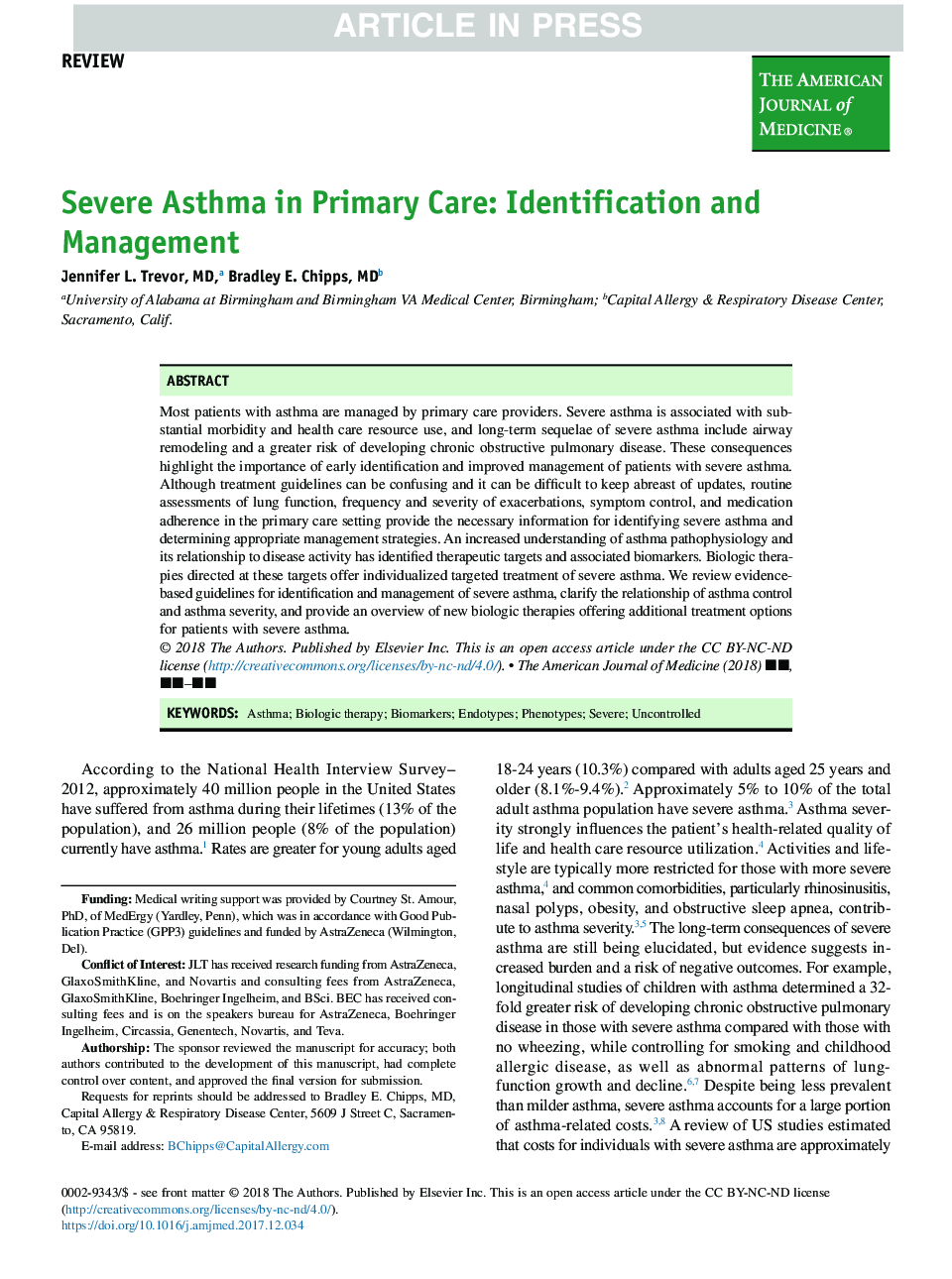| کد مقاله | کد نشریه | سال انتشار | مقاله انگلیسی | نسخه تمام متن |
|---|---|---|---|---|
| 8603819 | 1566084 | 2018 | 8 صفحه PDF | دانلود رایگان |
عنوان انگلیسی مقاله ISI
Severe Asthma in Primary Care: Identification and Management
ترجمه فارسی عنوان
آسم شدید در مراقبت اولیه: شناسایی و مدیریت
دانلود مقاله + سفارش ترجمه
دانلود مقاله ISI انگلیسی
رایگان برای ایرانیان
کلمات کلیدی
آسم، درمان بیولوژیک، بیومارکرها، اندوتایپ، فنوتیپ ها، شدید کنترل نشده
ترجمه چکیده
بیشتر بیماران مبتلا به آسم توسط ارائه دهندگان مراقبت های اولیه اداره می شوند. آسم شدید همراه با استفاده از منابع مضر و مراقبت های بهداشتی بسیار مهم است و عواقب درازمدت آسم شدید شامل ترمیم مجدد راه هوایی و افزایش خطر ابتلا به بیماری مزمن انسدادی ریوی است. این عواقب اهمیت شناسایی زودهنگام و بهبود مدیریت بیماران مبتلا به آسم شدید را برجسته می کند. اگر چه دستورالعمل های درمان می تواند گیج کننده باشد و ممکن است دشوار نگه داشتن روزافزون از به روز رسانی، ارزیابی های معمول از عملکرد ریه، فرکانس و شدت تشدید، کنترل علائم و پیوستن به دارو در مراقبت های اولیه، اطلاعات لازم برای شناسایی آسم شدید و تعیین راهبردهای مدیریت مناسب درک فزاینده پاتوفیزیولوژی آسم و ارتباط آن با فعالیت بیماری، اهداف درمانی و بیومارکرهای مرتبط را مشخص کرده است. درمان های بیولوژیک که به این اهداف هدایت می شوند، درمان آتی شدید را هدف قرار می دهند. ما بر اساس راهنمایی های مبتنی بر شواهد برای شناسایی و مدیریت آسم شدید، بررسی ارتباط کنترل آسم و شدت آسم را بررسی می کنیم، و یک مرور کلی از روش های جدید زیست شناختی ارائه می دهیم که گزینه های درمان اضافی را برای بیماران مبتلا به آسم شدید ارائه می دهند.
موضوعات مرتبط
علوم پزشکی و سلامت
پزشکی و دندانپزشکی
پزشکی و دندانپزشکی (عمومی)
چکیده انگلیسی
Most patients with asthma are managed by primary care providers. Severe asthma is associated with substantial morbidity and health care resource use, and long-term sequelae of severe asthma include airway remodeling and a greater risk of developing chronic obstructive pulmonary disease. These consequences highlight the importance of early identification and improved management of patients with severe asthma. Although treatment guidelines can be confusing and it can be difficult to keep abreast of updates, routine assessments of lung function, frequency and severity of exacerbations, symptom control, and medication adherence in the primary care setting provide the necessary information for identifying severe asthma and determining appropriate management strategies. An increased understanding of asthma pathophysiology and its relationship to disease activity has identified therapeutic targets and associated biomarkers. Biologic therapies directed at these targets offer individualized targeted treatment of severe asthma. We review evidence-based guidelines for identification and management of severe asthma, clarify the relationship of asthma control and asthma severity, and provide an overview of new biologic therapies offering additional treatment options for patients with severe asthma.
ناشر
Database: Elsevier - ScienceDirect (ساینس دایرکت)
Journal: The American Journal of Medicine - Volume 131, Issue 5, May 2018, Pages 484-491
Journal: The American Journal of Medicine - Volume 131, Issue 5, May 2018, Pages 484-491
نویسندگان
Jennifer L. MD, Bradley E. MD,
